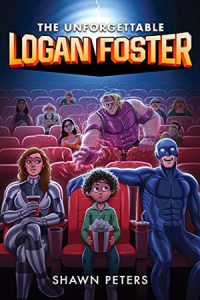 Twelve-year-old Logan Foster is good at research, deductive reasoning, and logical problem-solving. However, he is not so adept at emotional responses, human interaction, and reading social cues. This unique protagonist evolves into the hero of Shawn Peters’ novel The Unforgettable Logan Foster.
Twelve-year-old Logan Foster is good at research, deductive reasoning, and logical problem-solving. However, he is not so adept at emotional responses, human interaction, and reading social cues. This unique protagonist evolves into the hero of Shawn Peters’ novel The Unforgettable Logan Foster.
Set in Santa Monica, California, Peters’ novel retells the story of an orphan who loves comics. Logan considers comics relatable because most superheroes are orphans. They also work to undermine villains and thwart bullies.
When Gil Grant and Margie Morrow visit the El Segundo Transitional Orphanage (ESTO) as promising prospective foster parents, Logan experiences the feeling of being wanted and decides it feels good. However, Logan can tell that something is suspicious. After all, both Margie and Gil are keeping secrets. Neither seems to sleep and Gil never eats. These anomalies lead Logan to wonder about the identities of his new parents. With his eidetic memory, Logan begins assembling pieces of the puzzle and discovers that his foster parents are actually members of the Multinational Authority for Superhuman Coordination (MASC).
Margie and Gil select Logan as their foster child because they see his honesty, independence, and resilience. “We have powers, so people have made us feel special instead of just strange. But you. . . you’ve never had the benefit of that. You’re still this amazing person. And you don’t let other people’s views on what’s an ability or what’s a disability define you” (148).
When Margie and Gil don’t return home one night, Logan elicits the help of his neighbor, Elena Arguello. Elena is a high school sophomore who loves sports. This biracial, bilingual, athlete who is taller and faster than everyone in her class isn’t easily freaked out about weird occurrences. After all, she questions the very notion of normal. “Worrying about what’s ‘normal’ . . . it’s just a waste of time” (169).
Besides building empathy for those with a compromised sense of belonging and encouraging all of us to be amazing despite doubters and bullies who see disability rather than difference, Peters’ book shares other key motifs and morals. The motif of the comic book figures prominently in Logan’s story. According to Dr. Chrysler, the MASC Director, comic books came into being to keep the existence of superheroes a secret. Not about frivolous things meant to elicit laughs from children, superhero comics are intended to make the impossible seem possible. “It was the perfect way to introduce the world to great heroes while blurring the lines between what was real and what was imagined” (117). Through comic books, radio shows, movies, television, and video games, the existence of the superhero was normalized—making the strange familiar.
Another significant point emerges in a discussion about the bystander effect and the diffusion of responsibility. While considerable psychology is involved in understanding human behavior in crisis situations, Peters argues that we need to speak up when witnessing an act of bullying or a potential assault. Through his characters’ actions, Peters reveals that the intervention of bystanders is often the only reason why bullying and other crimes cease. If this book can be said to have life-saving value, then the message that would be its strongest is that the social and behavioral paralysis described by the bystander effect can be reduced with awareness.
A related moral comes in Dr. Chrysler’s words as he explains to Logan that superheroes live among us but that we reject the possibility: “The human mind is happy to accept a semi-reasonable lie much more readily than an inconvenient fact” (124).
Through metaphor, Peters also posits a theory about why revolutions form. Feeling alienated or marginalized, a certain group might wish to escape slavery and servitude. They coin rallying cries: “Claim your rightful places above the petty regulation of humans” or “Help us dismantle the abomination that is MASC, so people like us can live out in the open, without hiding. . . and finally decide for ourselves how we wish to use our gifts” (191). Yet, in any revolution, innocents are hurt before justice prevails.
A good pair of misfits, Elena and Logan resist being victims and save the day. Like Necros, both Elena and Logan know what it is like to have abilities that could be an asset if others weren’t so confused by them.
- Posted by Donna


Wow! Thank you for such a thoughtful and deep review of my debut. I certainly wrote this book to be entertaining for young readers, with a fair amount of escapism and pop culture threaded throughout. But I appreciate how you’ve brought forward some of the deeper, and more nuanced themes. I can only hope those messages will resonate with the target audience, and anyone else who discovers the book. Many thanks!